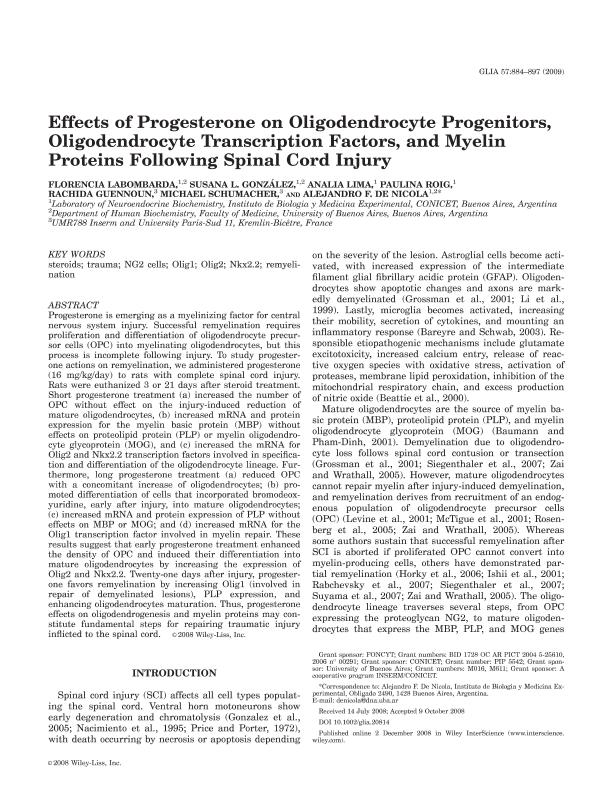Artículo
Effects of progesterona on oligodendrocyte progenitors, oligodendrocyte transcription factors, and myelin proteins following spinal cord injury
Labombarda, Maria Florencia ; Gonzalez, Susana Laura
; Gonzalez, Susana Laura ; Lima, Analia Ethel
; Lima, Analia Ethel ; Roig, Paulina
; Roig, Paulina ; Guennoun, Rachida; Schumacher, Michael; de Nicola, Alejandro Federico
; Guennoun, Rachida; Schumacher, Michael; de Nicola, Alejandro Federico
 ; Gonzalez, Susana Laura
; Gonzalez, Susana Laura ; Lima, Analia Ethel
; Lima, Analia Ethel ; Roig, Paulina
; Roig, Paulina ; Guennoun, Rachida; Schumacher, Michael; de Nicola, Alejandro Federico
; Guennoun, Rachida; Schumacher, Michael; de Nicola, Alejandro Federico
Fecha de publicación:
2009
Editorial:
Wiley
Revista:
Glia
ISSN:
0894-1491
e-ISSN:
1098-1136
Idioma:
Inglés
Tipo de recurso:
Artículo publicado
Clasificación temática:
Resumen
Progesterone is emerging as a myelinizing factor for central nervous system injury. Successful remyelination requires proliferation and differentiation of oligodendrocyte precursor cells (OPC) into myelinating oligodendrocytes (OL), but this process is incomplete following injury. To study progesterone actions on remyelination, we administered progesterone (16 mg/kg/day) to rats with complete spinal cord injury. Rats were euthanized 3 or 21 days after steroid treatment. Short progesterone treatment: a) increased the number of OPC without effect on the injury-induced reduction of mature OL; b) increased mRNA and protein expression for the myelin basic protein (MBP) without effects on proteolipid protein (PLP) or myelin oligodendrocyte glycoprotein (MOG) and c) increased the mRNA for Olig2 and Nkx2.2 transcription factors involved in specification and differentiation of the OL lineage. Furthermore, long progesterone treatment: a) reduced OPC with a concomitant increase of OL; b) promoted differentiation of cells that incorporated bromodeoxyuridine, early after injury, into mature OL; c) increased mRNA and protein expression of PLP without effects on MBP or MOG and d) increased mRNA for the Olig1 transcription factor involved in myelin repair. These results suggest that early progesterone treatment enhanced the density of OPC and induced their differentiation into mature OL by increasing the expression of Olig2 and Nkx2.2. Twenty one days after injury, progesterone favors remyelination by increasing Olig1 (involved in repair of demyelinated lesions), PLP expression and enhancing OL maturation. Thus, progesterone effects on oligodendrogenesis and myelin proteins may constitute fundamental steps for repairing traumatic injury inflicted to the spinal cord.
Palabras clave:
Steroid
,
Trauma
,
Spinal Cord Injury
,
Progesterone
,
Remyelination
Archivos asociados
Licencia
Identificadores
Colecciones
Articulos(IBYME)
Articulos de INST.DE BIOLOGIA Y MEDICINA EXPERIMENTAL (I)
Articulos de INST.DE BIOLOGIA Y MEDICINA EXPERIMENTAL (I)
Citación
Labombarda, Maria Florencia; Gonzalez, Susana Laura; Lima, Analia Ethel; Roig, Paulina; Guennoun, Rachida; et al.; Effects of progesterona on oligodendrocyte progenitors, oligodendrocyte transcription factors, and myelin proteins following spinal cord injury; Wiley; Glia; 57; 8; -1-2009; 884-897
Compartir
Altmétricas



